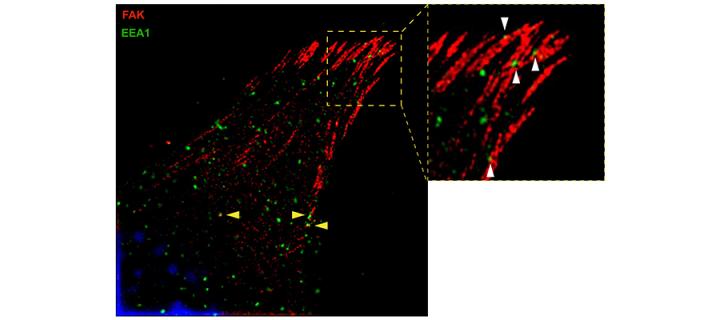Postdoc Opportunities in Frame and Brunton Groups
Following award of funding from Cancer Research UK, and others, the Frame and Brunton Groups have openings for postdoctoral researchers: June 2018

The Cancer Biology Group, led by Professor Margaret Frame, and the Cancer Therapeutics Group, led by Professor Val Brunton, have strong track records in studying cancer signalling, protein adhesion networks and developing potential anticancer therapeutics.
For many years, the Groups concentrated their research efforts on understanding events associated with cancer invasion and metastasis, in particular the importance of signalling involving the non-receptor tyrosine kinase FAK (Focal Adhesion Kinase) and the kinases from the Src family. The Groups provided data demonstrating an essential role of FAK in cancer progression and a breadth of information on interacting partners and cellular physiology of FAK and Src, as well as on roles of these proteins in cancer metastasis (please visit the Groups’ websites (see links below) for full publications lists).
Recently, the Frame and Brunton labs and their collaborators made a seminal discovery that FAK promotes tumour evasion by inducing an immuno-suppressive microenvironment and that this is mediated by nuclear rather than cell adhesion-associated FAK. In addition, they demonstrated that nuclear FAK promotes transcription of chemokines that drive recruitment of regulatory T lymphocytes (Cell 2015;163(1):160-73). This study not only directly led to clinical trials in the UK and internationally to test FAK inhibitors in combination with immune checkpoint blockade therapeutic in multiple cancers, but also transformed the field of cell adhesion research by emphasising the importance of nuclear shuttling of adhesion proteins and by revealing potential new therapeutic opportunities in targeting nuclear functions of these proteins.
Over the past two years, the Groups expanded their findings on this topic and provided important new insights on functions of other molecules regulating intracellular trafficking of cell adhesion proteins and/or cancer spread. Representative examples include papers in Science Signaling (2017, cover story), eLife (2017) and Cancer Research (2018). The Groups also contributed to development and testing of novel inhibitors of Src, FAK and other oncogenic tyrosine kinases with potential therapeutic implications. They have also been invited to write topical reviews on trafficking of adhesion proteins and adhesion protein networks by leading international review journals including Current Opinion in Cell Biology and Annual Review of Cell and Developmental Biology.
They have now been awarded substantial funding to explore adhesion protein networks in glioblastoma, a highly aggressive type of brain cancer, and to begin to analyse neurodegeneration-associated adhesion complexes. This has opened new job opportunities for postdoctoral-level scientists with interests in the following:
• Cancer molecular and cell biology (including new studies on glioblastoma)
• Proteomic analyses of adhesion complexes in cancer and neurodegenerative disorders (with Adam Byron)
• Tumour microenvironment, including anti-tumour immunity
• Protein trafficking (with Adam Byron)
• Drug discovery and cancer pharmacology
Interested researchers are encouraged to contact Prof Margaret Frame (m.frame@ed.ac.uk), Prof Val Brunton (v.brunton@ed.ac.uk) or Dr Adam Byron (adam.byron@igmm.ed.ac.uk) for informal discussion or to apply directly at the link below.

